Last year Weatherby made news with the introduction of their Model 307, a Remington 700 based action that was designed and made at their Sheridan, Wyoming, headquarters. The 307 is intended to be a modular action that bridges the gap between the Howa-made Vanguard and the flagship Mark V Weatherby actions. This Remington 700 style makes them compatible with more parts, and in addition to production rifles, Weatherby offers the action as a stand-alone item too. The 307 was initially offered in two models, the Alpine and Range XP, but in early 2024, the company paid homage to the classic-styled Weatherby hunting rifle with the new walnut-stocked Weatherby 307 Adventure SD — a rifle that shone like an oasis in the Kalahari when I first opened the box.
Weatherby 307 Adventure SD Specs
See It
- Cartridges: .30/06 (tested), .270 Win., .240 Wby. Mag., .257 Wby. Mag, .270 Wby. Mag., .300 Wby. Mag., 6.5 Wby. RPM, 6.5-300 Wby. Mag., and 7mm PRC
- Barrel: 24 inches, fluted, 1:10 twist, threaded ½-28
- Receiver: Model 307, Remington 700 pattern, black Cerakote
- Stock: Walnut/Rosewood
- Trigger: TriggerTech, 2 pounds, 11 ounces (measured), adjustable from 2.5 to 5 pounds
- Weight: tk pounds, tk ounces (measured with empty magazine)
- Price: $1,650
Key Features
- Remington 700 footprint
- Long-action design
- Black Cerakote finish on metal parts
- Hinged floorplate magazine
- Muzzle threaded ½-28 (radial muzzle brake and thread protector included)
- Traditional Weatherby-styled walnut stock
- One-piece Picatinny rail optics mount
Review Highlights
- Traditional-styled hunting rifle utilizing Weatherby’s 307 Action
- Great accuracy with premium ammo
- Crisp adjustable trigger
- Magazine didn’t always feed smoothly
- Wood finish spotted when rained on
- Accuracy: 1.004 inches (average of 17 five-shot groups with four types of ammo)
The Weatherby 307, A Rifle to Bridge the Gap
Weatherby has been hard at work since the company’s relocation to Wyoming a few years ago, and the brand has dramatically expanded the scope of rifles they produce — in both model and material. We’ve seen expansions of their long-standing Vanguard and Mark V lineups, but between those, there was a hefty price and quality difference. The Vanguards — essentially Howa 1500 actions — are great mid-priced hunting rifles, usually starting at around $800. To jump up to the Mark V, however, will cost you an additional $700 to get in the ballpark, with prices starting at $1,500 for the Mark V Hunter. The Weatherby 307 is specifically intended to be the middle ground. A higher-quality, American-made rifle that’s priced between $1,000 and $2,000. Considering the absence of Remington Arms in the market, a Remington 700 style action was the logical choice. It’s compatible with more accessories, stocks, and aftermarket triggers than just about anything else. Additionally, the platform has been around long enough that an experienced rifle maker should have little trouble getting them to shoot well.
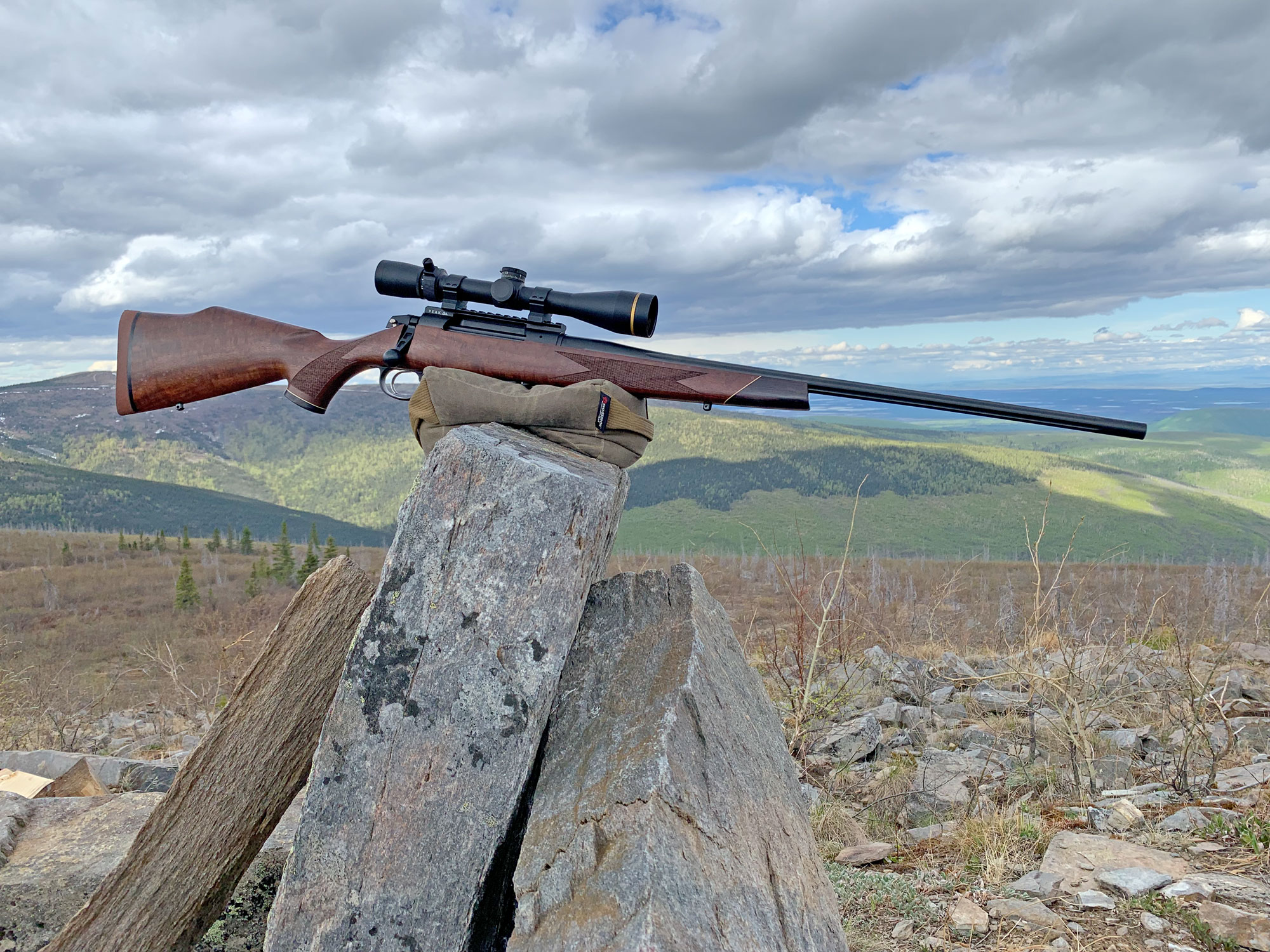
Tyler Freel
The Weatherby 307 Action
There aren’t a lot of surprises in the Weatherby 307 action, but some nice touches beyond what the standard Remington 700 action offers. At its core, it is still a simple two-lug, push-feed action with a 90-degree bolt throw, plunger ejector, and two-position safety. The Model 307 has a flared ejection port that’s longer at the bottom than at the top, and comes standard with a Peak 44 Picatinny rail for optics mounting — though it’s compatible with standard Remington 700 bases.
The Weatherby 307 has a bolt with some smart features, including an M16-style claw extractor and simple tool-less takedown for easy maintenance. An advantage of the M700 platform is trigger compatibility, and Weatherby fits the model 307 with TriggerTech Field triggers that are crisp and adjustable down to about 2.5 pounds.
The action is given a Cerakote finish and it runs smoothly with little wobble or slop. The bolt cocks easily and the locking lugs feel smooth and snug when rotating the bolt into battery. The Weatherby 307 Adventure SD features a hinged floorplate magazine that is tightly fit but easily released by a button inside the front of the trigger guard.
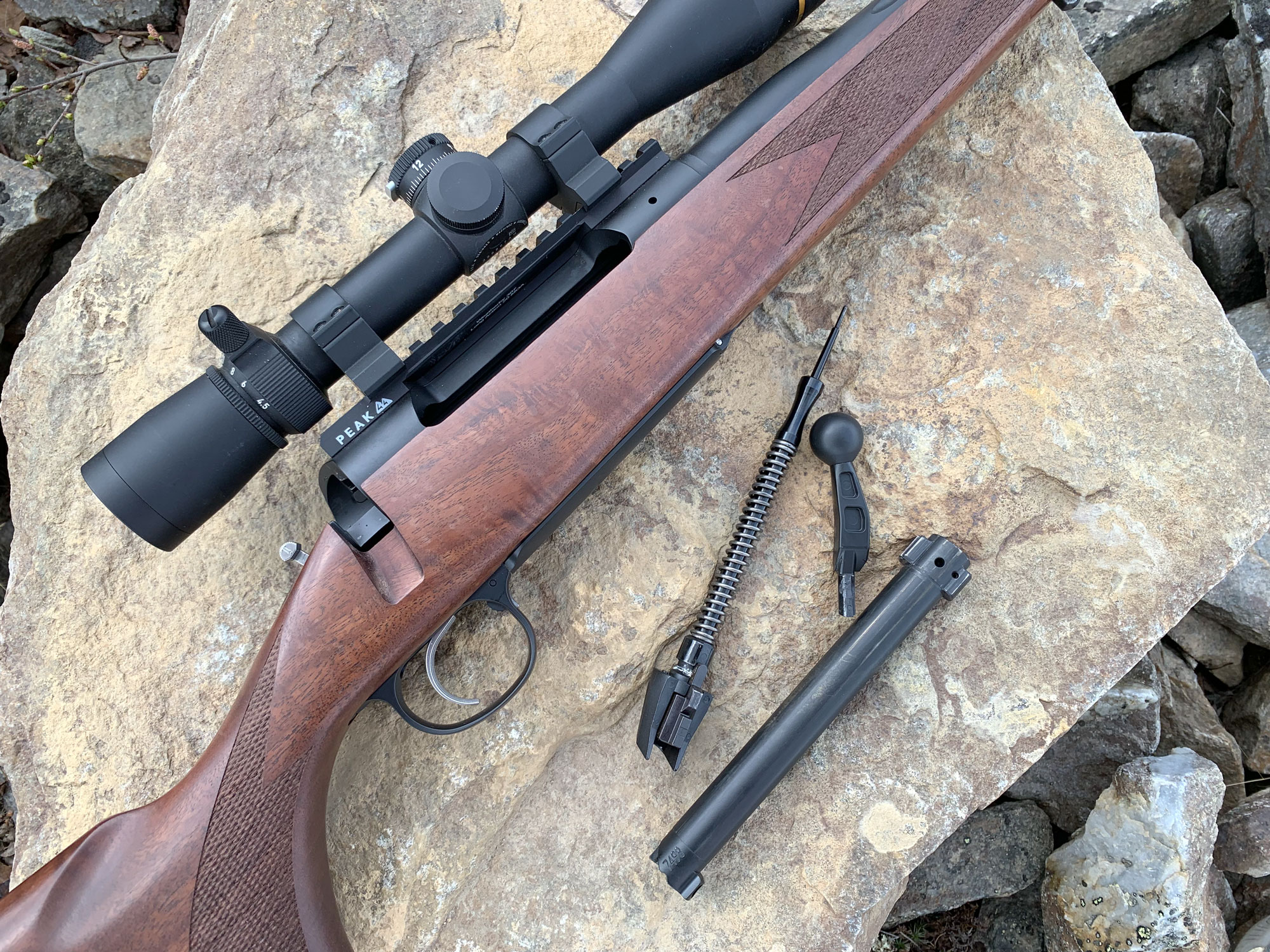
Tyler Freel
The Weatherby 307 Adventure: A Nod to the Classics
The visual focal point of the Weatherby 307 Adventure SD is, of course, its fancy walnut stock. Wood-stocked hunting rifles might be obsolete in some ways, but they certainly haven’t been banished to obscurity. In fact, we’ve seen a number of new rifle models offered in wooden trim in recent years. To some folks, a rifle just isn’t a rifle without a wood stock.
I was taken back when I first pulled the Weatherby 307 from its wrapping, admiring the rich wood grain. I’m no Jim Carmichel, an expert in wood stock making, but I can certainly appreciate the beauty of this piece of timber. The stock is crafted in traditional Weatherby style with a pronounced Monte Carlo comb, rosewood-capped pistol grip with white diamond inlay, a flat-bottomed forend, and capped with a rearward-slanting piece of rosewood.
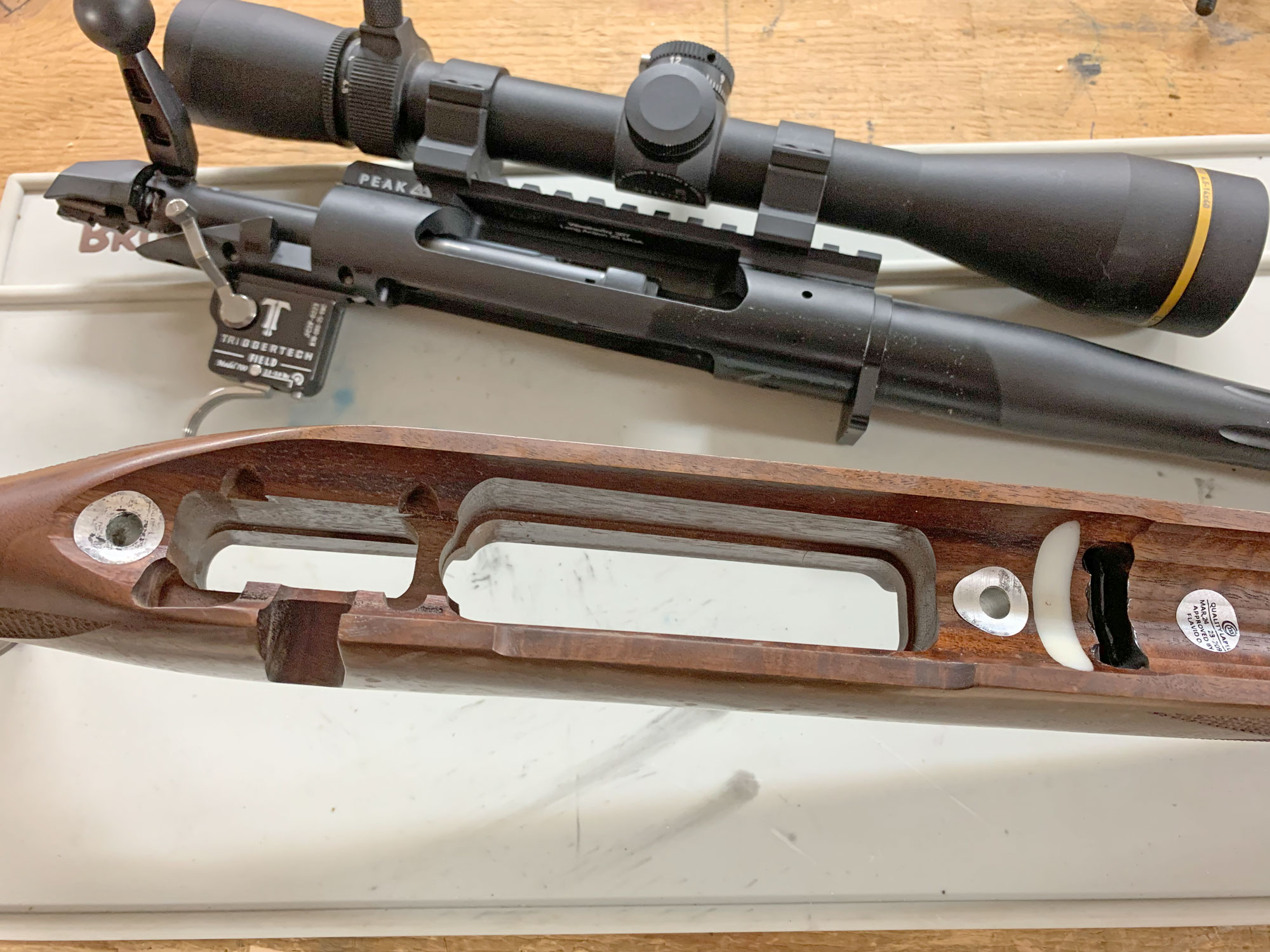
Tyler Freel
Under the hood, the stock is fitted with aluminum bedding pillars and a reinforcing polymer block embedded slightly behind the recoil lug recess. The recoil lug recess has some glass bedding, but it’s minimal. Action fit is tight and repeatable, and the pillars eliminate any slop or compression. This is important for torquing this action, as the M700-pattern actions don’t offer a lot of thread engagement with the front action screw.
For a production stock, the metal-to-wood fit is good and the barrel channel is evenly spaced. There is a slightly uneven fit and excess space in the inletting around the trigger guard on my sample, but that’s getting nitpicky for a $1,650 rifle. The only complaint I have about the stock is its finish. Though beautiful, it doesn’t handle exposure to moisture well. While at the range one day, I had about a 15 second spat of rain that peppered the gun. When the rain dried, that side of the stock had already spotted — something that would take the application of additional finish to fix or conceal. Wood stocks can’t be expected to be as durable as composites in inclement weather, but there are many wood finishes that won’t dissolve like the Wicked Witch of the West at the first raindrop..
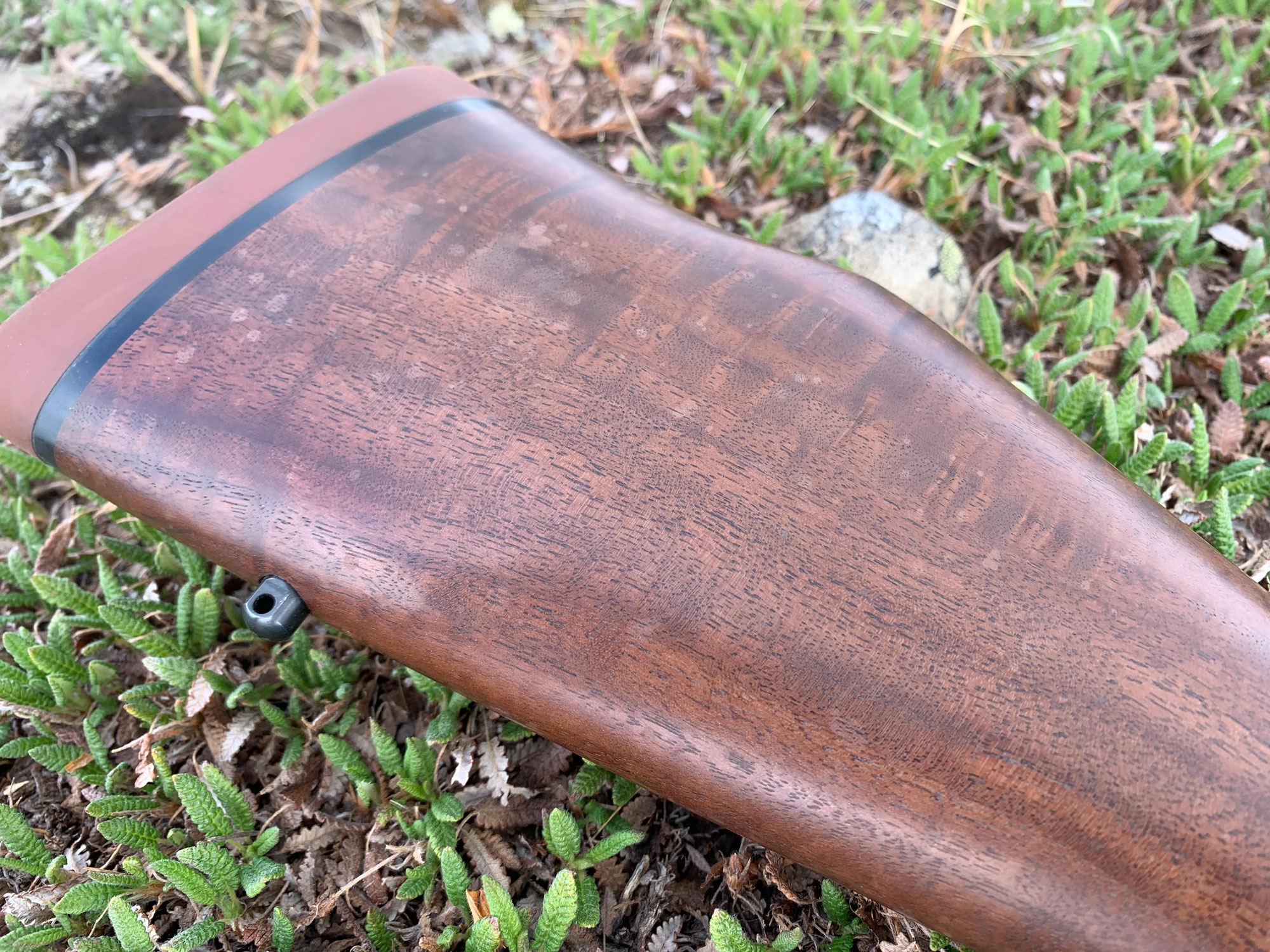
Tyler Freel
A Blend of Classic and Modern
As silly as it is, one of the features of the Weatherby 307 Adventure SD that I find most appealing is the hinged floorplate magazine. Detachable magazines have their merits, but I’m a sucker for top-loaders. This — along with the walnut trim — produces a rifle that has a very old-school feel. But it doesn’t mean you’re sacrificing the advantages of modern tech either. The matte black Cerakote finish looks sharp and is more durable and corrosion resistant than the bluest bluing that was ever blued.
The bolt and trigger are easily adjusted and maintained, and the threaded muzzle allows the use of a suppressor. Oddly, Weatherby chose to roll with a ½-28 thread on all their Model 307 rifles. That’s standard for .224-caliber and 9mm barrels, but a ⅝-24 threading is what we typically see on larger calibers like 6mm, 6.5mm, and 30-caliber. The rifle comes fitted with a radial muzzle brake, but if you don’t want to use that or a suppressor, you can use the included thread protector that fits nicely on the end of the fluted barrel without compromising the classic look.
The Weatherby 307 Adventure SD on the Range
Feature sets and fancy stocks aside, it’s the rifle’s performance that really matters, and I was a little nervous when I first took the Weatherby 307 Adventure SD to the range. That’s because it wasn’t my first experience with the 307, or my second. I’d had the chance to try both initial models of the 307 chambered in .308 Win. back in 2023 and both shot pretty poorly. My trepidation melted away as I printed the first group with this .30/06 though. The tight cluster of holes was an early indication of how the rifle performs.
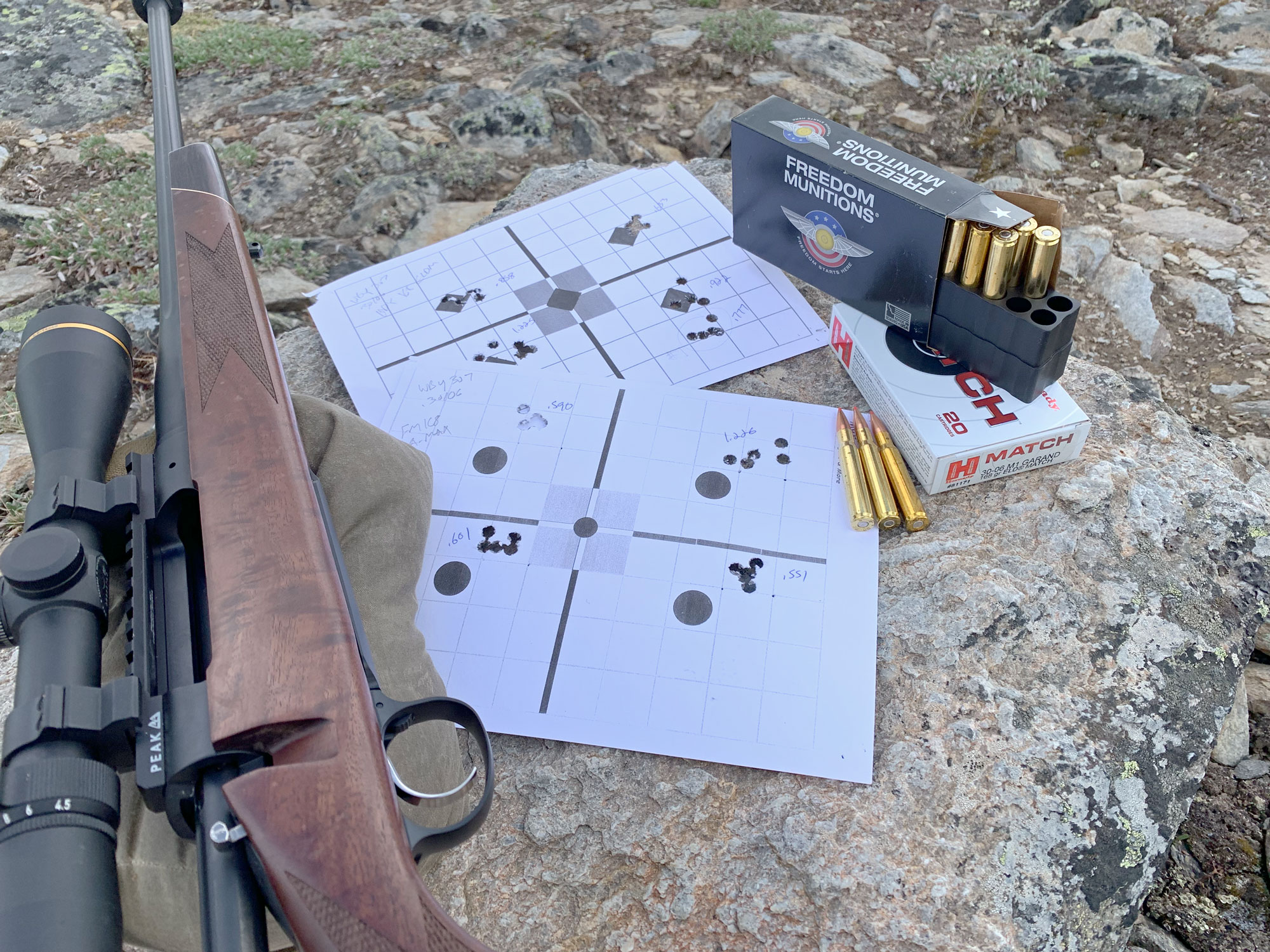
Tyler Freel
To test the accuracy potential of a rifle, it helps to have quality, accurate ammunition that you have proofed through other good-shooting firearms. In this case, I had two match M1 Garand loads that shot lights out in a custom Winchester M70 with a heavy Krieger barrel — Hornady’s M1 Garand 168-grain ELD-M and Freedom Munitions 168-grain A-Max. Both shot incredibly well out of this sporter-weight rifle. I had decent results with a budget-priced Sellier & Bellot 150-grain Soft Point load — average of 1.490-inch 5-shot groups — but would expect some variability with most hunting ammo. I also had good results hand loading 180-grain Nosler Accubonds over a charge of IMR 4350.
| Load | 3-Shot Group Size | 5-Shot Group Size | Overall 20-Shot Group Size | Mean Radius (20 shots) |
| Hornady 168-gr. ELD-M | N/A | .883 inches | 1.23 inches | .39 inches |
| Freedom Munitions 168-gr. A-Max | .556 inches | N/A | 1.09 inches | .28 inches |
| Freedom Munitions 168-gr. A-Max | N/A | .742 inches | 1.23 inches | .32 inches |
| Nosler 180-gr. Accubond with IMR 4350 | N/A | .884 inches | 1.12 inches | .32 inches |
You may have noticed in recent months that we have been changing the way we characterize and present accuracy data, using larger 20-shot group sizes and terms like mean radius. Outdoor Life has long strived to present the best, most informative data possible, and though we’ve leaned on averages of five-shot group sizes for decades, we realize that it just isn’t good enough anymore. Larger sample testing has shown us a more detailed picture of how each rifle shoots, and even busted some myths about accuracy and load development.
I collected the data in the table above by compiling series of three- and five-shot groups into 20-shot overall groups. The barrel is allowed to cool after each three- or five-shot group. This is easily done and can even help you attain a more accurate zero for your hunting rifle. Most importantly, it takes every shot into account and gives you a realistic picture of how you can expect your rifle to perform. Interestingly, I compared 20-shot strings compiled with three- and five-shot groups and they are virtually identical. In this case, the three-shot groups have a marginal edge, but that is likely within the variability of 20-shot sample sizes. Other rifles are showing virtually no difference between three- and five-shot groups which pours some cold water on the old story of a flier caused by shooting more than three shots at a time.
Practical Shooting
I spent quite a bit of time shooting the Weatherby 307 Adventure SD from practical field positions too. I ran it off a barricade and a bagged tripod, as well as offhand. The rifle generally handles well, but takes some getting used to if you’re accustomed to short-throw bolts.
I did have mixed results with the internal magazine. With some ammo, the rifle seemed to feed and function totally fine, but with other loads, the bolt would often fail to pick up the next cartridge when that cartridge was on the port side of the double-stack magazine. I’d be hesitant to use it in a situation where I needed absolute reliability — at least until I proved it with many repetitions. This issue isn’t unique to this rifle, and many Remington 700-pattern guns can be finicky feeders at times.
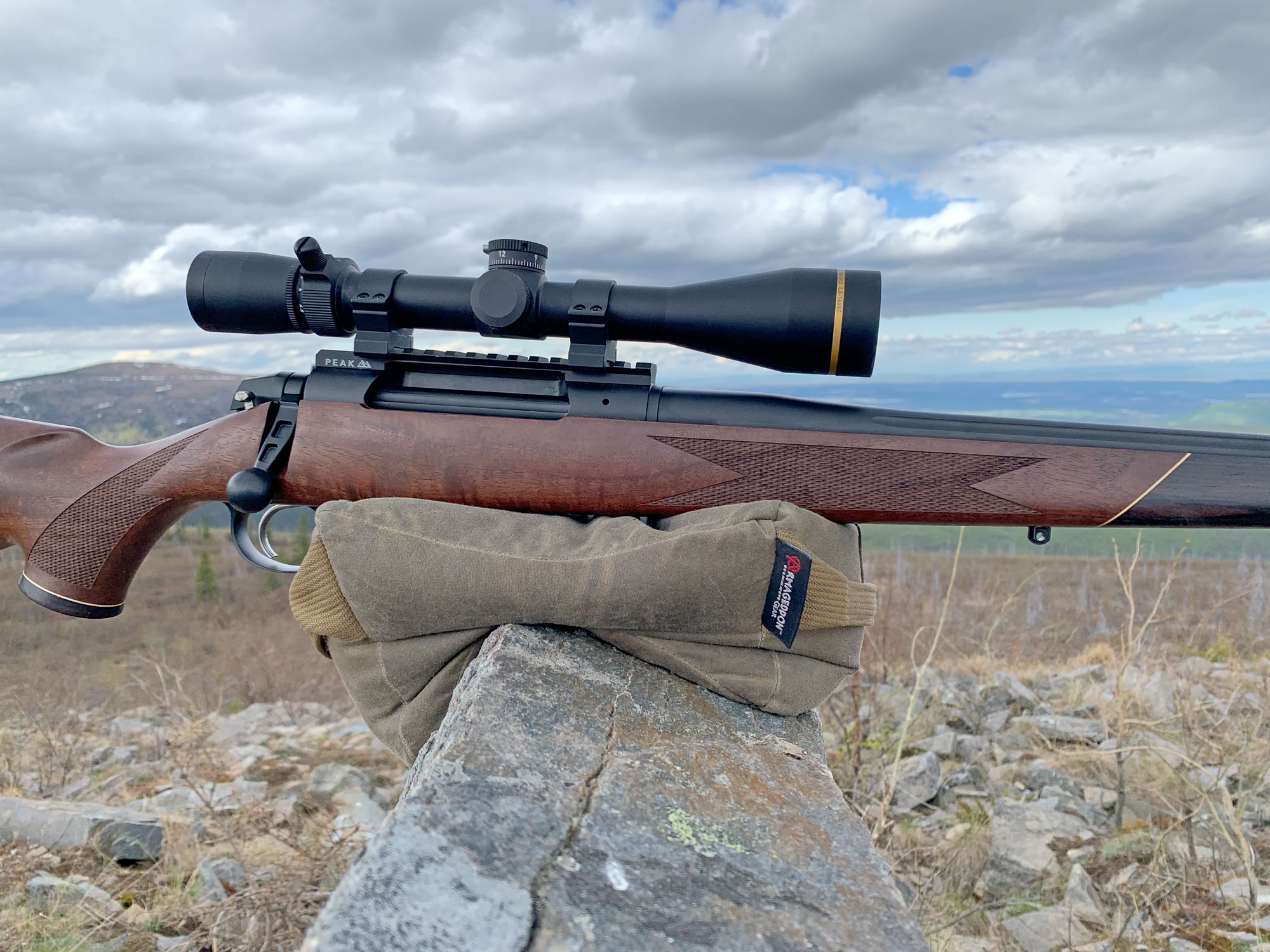
Tyler Freel
Pros and Cons of the Weatherby 307 Adventure SD
- Pros: Rich, good-looking wood; nice, even Cerakote finish; suppressor ready; easy bolt maintenance and trigger adjustment
- Cons: Stock finish spotted with a few rain drops; magazine had trouble feeding sometimes
Final Thoughts on the Weatherby 307 Adventure SD
I’m really happy to see Weatherby hit this price bracket with quality guns that are built in the U.S., and the blend of classic style and modern features is a winning combo. I’m quite pleased with the stellar accuracy that this rifle displayed — especially considering the minimal bedding it has. I’d like to see a more durable stock finish, but considering the price, I think it’s a really solid value.
Read the full article here




